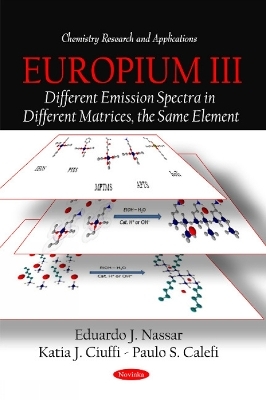
Europium III
Different Emission Spectra in Different Matrices, the Same Element
Seiten
2011
Nova Science Publishers Inc (Verlag)
978-1-61728-306-2 (ISBN)
Nova Science Publishers Inc (Verlag)
978-1-61728-306-2 (ISBN)
Reviews research on the photoluminescence of the europium ion in different materials, prepared by hydrolytic and non-hydrolytic sol-gel methodologies and intercalation in kaolinite.
Europium belongs to the lanthanide series of the periodic table. The most important property of this element is its luminescence, which can be defined as emission of light by a material as a consequence of energy absorption. Such property leads to the main use of this element; that is, its application as phosphor, which emits colored light through electroluminescent processes, with potential utilisation in computer and TV displays. Many scientists employ the luminescence spectroscopy of the europium ion to elucidate the structure of natural and synthetic compounds. This book reviews research on the photoluminescence of the europium ion in different materials, prepared by hydrolytic and non-hydrolytic sol-gel methodologies and intercalation in kaolinite.
Europium belongs to the lanthanide series of the periodic table. The most important property of this element is its luminescence, which can be defined as emission of light by a material as a consequence of energy absorption. Such property leads to the main use of this element; that is, its application as phosphor, which emits colored light through electroluminescent processes, with potential utilisation in computer and TV displays. Many scientists employ the luminescence spectroscopy of the europium ion to elucidate the structure of natural and synthetic compounds. This book reviews research on the photoluminescence of the europium ion in different materials, prepared by hydrolytic and non-hydrolytic sol-gel methodologies and intercalation in kaolinite.
Introduction; Hydrolytic Sol-Gel Process; Characterization Techniques; Conclusion; Index.
| Zusatzinfo | Illustrations |
|---|---|
| Verlagsort | New York |
| Sprache | englisch |
| Maße | 230 x 155 mm |
| Gewicht | 166 g |
| Themenwelt | Naturwissenschaften ► Chemie ► Anorganische Chemie |
| ISBN-10 | 1-61728-306-1 / 1617283061 |
| ISBN-13 | 978-1-61728-306-2 / 9781617283062 |
| Zustand | Neuware |
| Haben Sie eine Frage zum Produkt? |
Mehr entdecken
aus dem Bereich
aus dem Bereich
Buch | Hardcover (2024)
Springer Spektrum (Verlag)
CHF 89,95


